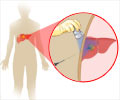A key signaling protein that helps suppress inflammation and scarring in the liver has been discovered by scientists.

‘A key signaling protein that helps suppress inflammation and scarring in the liver has been discovered by scientists.’





"Our findings are very important because they help predict which
patients will respond to vitamin D analogs," said Jorge Moscat, deputy director and professor in the NCI-designated Cancer Center and
co-senior author of the paper. "We show that those drugs' ability to
suppress liver damage requires p62, which in liver tumors is usually
absent from the cells that initiate the inflammatory cascade."Moscat and Maria Diaz-Meco, also a professor in the Cancer Center and co-senior author, have long been interested in p62, a molecular communication hub in the cell. Their previous studies have shown that high levels of p62 promote cancer. However, a recent investigation in prostate cancer found that in the tumor's surroundings, p62 dampens production of inflammatory signals that fuel cancer growth.
The new study looked at whether p62 has these opposing functions in other types of cancer as well. Because they'd previously studied p62 in liver cancer, they removed it from the cells that become its support system--hepatic stellate cells. These cells, which make up a small proportion of liver tissue, are tremendously important since they normally store vitamin A and support liver regeneration.
Interestingly, in mice lacking p62 specifically in stellate cells, they saw more liver inflammation and fibrosis and, when they were given a chemical that causes liver cancer, more tumors.
"Whether p62 is pro- or anti-cancer appears to depend on the cell type," explained Diaz-Meco. "In cancer cells, it's bad, but in surrounding cells that feed the tumor, it's good."
Advertisement
The researchers wanted to know which of its opposing roles was most important, so they turned off the gene for p62 throughout the body in another set of mice. These mice also had more liver tumors than mice with p62, showing that hepatic stellate cells play a key part in promoting cancer.
Advertisement
"Vitamin D and its analogs may still help prevent cancer in patients with hepatitis or fatty liver disease," commented Diaz-Meco. "At that stage, enough p62 may still be present in stellate cells for the vitamin D receptor to work."
"Since p62 is so important in preventing liver cancer, we're now interested in why it disappears in stellate cells," said Moscat. "We plan to explore that question, which may lead to ways to turn its expression back on, which should block liver cancer progression."
Source-Eurekalert















